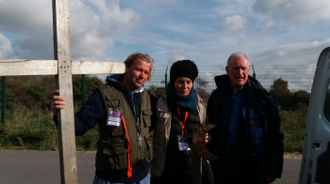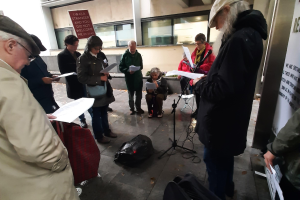Is the Calais camp really closed?

Br Johannes, Marie-Christine and Fr Joe with the cross and crescent from the demolish church and mosque
Justice and Peace Visit to Calais November 3rd and 4th 2016
"Migrants have gravitated to the North French coast for the last 17 years," we were told, on our Justice and Peace visit to France on 3rd-4th November. "And we will wait just a few weeks for them to start drifting back to seek access to the UK all over again." This is the background to the highly publicised Jungle camp clearances over the last two weeks.
Westminster Justice and Peace were visiting Calais to take food and toiletries from St John Vianney parish and to find out what the needs were after the Jungle camp clearances. Our first stop was at Ste Marie Skobstova Catholic Worker House, to leave the goods and make contact. Brother Johannes Maertens, explained that the house was operating like a hospice at the moment. We saw young men with, respectively, a broken arm, leg and jaw, but could not find out why, due to language barriers. One young man with cancer needed supporting in hospital. Johannes himself was exhausted. Other guests had had to leave in case there was a check up on their documentation. The food gifts were hugely important as the house had been feeding at least 11-12 people a night, and sometimes up to 20 or more.
Johannes, and Simon Jones - a Baptist minister from Bromley, took us to see the last of the shelters being demolished - on Thursday morning it was the Sudanese mosque being squashed like balsawood and dropped in a skip by a giant claw crusher. Johannes, Secours Catholique workers and a Muslim French woman managed to save, between them, the last cross and several of the paintings of the Ethiopian makeshift church, and a homemade metal crescent from one of the mosques. Everyone was anxious to have evidence of the symbols of hope that had kept many keeping on striving for survival in the 'Jungle' camp. Father Joe found a good working bicycle, and I a French-English dictionary. We wondered about the hopes that all these abandoned objects represented. The authorities did seem to have respected the sacred spaces of church and mosque, waiting till after dispersal to clear them, and had allowed the volunteers to salvage mementos.
We found the Jules Ferry purpose-built refugee centre, and witnessed the last buses taking the women and children away to the CAOs - reception-orientation centres of which around 300 have been set up throughout France. Dozens of security police were in attendance, but the compound and surroundings were fairly deserted. We waved as each coach left - taking refugees to some new unknown.
Next we visited the coordinator of the Secours-Catholique vestiaire, the newly-acquired clothing storage and distribution depot. Marie-Christine Descamps has worked there as a volunteer for 10 years, and the warehouse, recently transferred from a smaller building, showed a huge amount of her and others' careful planning. Clothes, sorted by size and type, had been distributed on specific days over two-week periods - men's on one day, women and children on another, shoes on another, and so on, to avoid chaos, and promote dignity. Marie-Christine organises 25 or more volunteers twice a week, not only sorting and distributing, but also providing a safe space during that day, with snacks, tea and coffee. She smiled: "Your English teabags - in wholesale quantities, not available in France, would be appreciated!"
Our bed-and-breakfast hostess - a retired teacher - filled out this volunteer picture: she has been helping in the camp and elsewhere on the coast for several years, and has supported Ethiopan men in particular, one of whom obtained asylum in France, and is now signed up to a programme of integration. Three are now in England, travelling by what means she didn't know. She told us that there had been many schemes of soup runs, and informal aid on the coast going back 17 years, from the closing of the Sangatte camp in 2002, through major expulsions in 2009, 2012 and 2014. The recent phenomenon was merely much more of the same trend: only in mega-proportions. "They will drift back," she said, as did Brother Johannes. The UK is the only hope for many who feel they have lost everything else but this gleam of possibility.
Our last port of call was to try and visit the newer, more secure camp in a Dunkirk suburb, set up by Médecins Sans Frontières, and now managed by the local authority of Grande Synthe. We arrived at the entry barrier, and explained we were looking for ways to support migrants, post-jungle clearance, but were turned away since Westminster Diocese Justice and Peace is not a registered charity there! We could apply, officials said, if we went to the Town Hall, just a few minutes' drive away. The Town Hall,alas, told us the system had changed, and to go back to explain this (we now know Grande Synthe main street well). The young kiosk officials did their best to persuade the camp director to let us in but it was not to be. While annoying for us, it is reassuring that this place offers inhabitants some protection not just from the curious but from smuggling gangs and other exploiters of such a vulnerable group.
We reflected on the good and the bad in our visit. There were some distressing sights of course; the young men virtually housebound at the Catholic Worker House either unable or unwilling to go out, whether for lack of mobility or of papers. And the knowledge that 6000 people were facing yet another twist in their fate, out of their control. And that there had been two attempted suicides amongst the young men known to the Catholic Worker.
The admirable French achievement in dispersing this huge number with as much dignity as possible cannot be underestimated however. While there have been some protests in various regions at having to accept numbers of these Calais migrants, the achievement of finding so many centres is astonishing. In answer to some regional criticism the French minister of housing, Emmanuelle Cosse replied: "'You can't have it both ways: criticising the State for not managing the situation, and then being astonished that we are taking things in hand."
The key to the success of the policy was, according to her, "We have shown the people that everything has been put in place to manage this exercise. And the charity world has cooperated with the effort."
Meanwhile, our government has paid out already £80m to secure more fencing in Calais, with a wall currently under construction. Moreover, Home Secretary Amber Rudd has recently promised a further £36million for the cost of the clearance of the camp. Some of this will presumably pay for all those coaches and policemen, some for identifying and receiving a small number of minors, and the rest on further security measures.
It is not hard to see which government has been more humanitarian. Meanwhile, civil society on both sides of the Channel has acted with compassion, practicality and solidarity, with the migrants and with one another. Simon Jones told us that bizarrely, immigration officials at Lunar House became more human, the lower down the hierarchy they were We at Justice and Peace will continue to work in partnership with the charitable associations we have met, and to resist the notion that we can be fenced off from Europe by millions of pounds worth of fencing.
The refugee 'crisis' has not gone away. The funding of war by our arms industry, providing drones, RPGs, tanks and fighter bombers is all the more tragic when we see these, usually male, refugees being pushed around so indiscriminately. The war crisis in Syria, not to mention ongoing war in Sudan and the violently enforced conscription in Eritrea will drive more people to Europe, and probably towards the North French coast. We must continue in partnership with Caritas France and other charities.


















